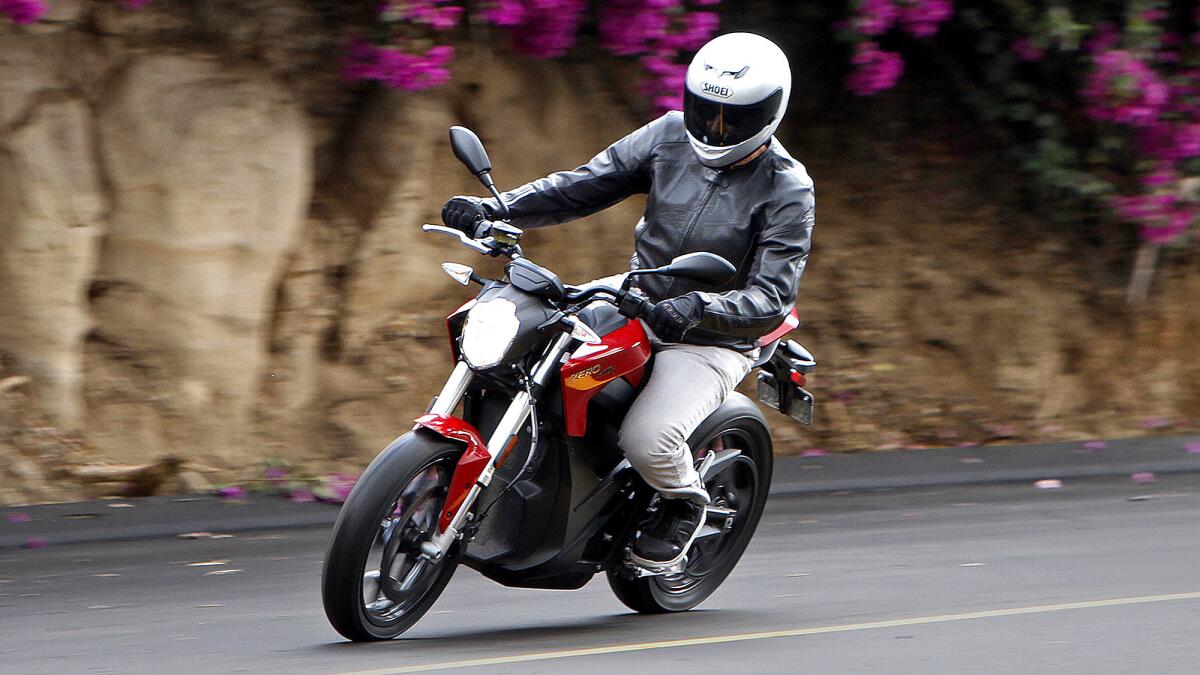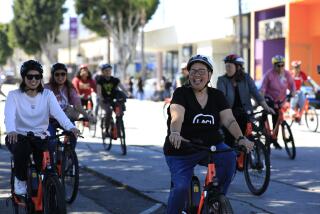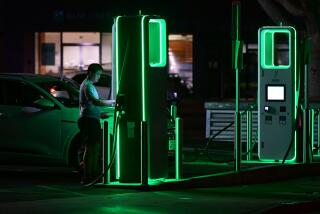Zero Motorcycles, suddenly dwarfed, responds with some bigger numbers

This time last year, Zero Motorcycles could comfortably claim to be the world’s leading electric motorcycle maker.
Then Harley-Davidson unveiled its electric LiveWire concept bike, and Polaris Industries acquired Brammo Motorcycles, positioning itself to match Harley.
The suddenly dwarfed California bikemaker responded by upping its game.
Nestled in the redwoods halfway between Santa Cruz and Silicon Valley, Zero has doubled its staff from about 60 to about 130, added VPs of quality and product development, and doubled its production capacity.
In addition to Harley and Polaris — the parent company of the Indian and Victory motorcycle lines — BMW has put an electric scooter on the market. Austrian KTM has begun selling an electric dirt bike, and Japan’s Yamaha has said it will put two electric motorcycles into production by 2016.
Zero is still a small player. The company built 1,300 of its high-end electric motorcycles in 2014, and will build 1,800 this year, the company said. By comparison, Harley-Davidson, the country’s largest manufacturer, builds that many gas-powered bikes every two days.
Still, Zero welcomes the motorcycle giants into its electric niche.
“We were thrilled by Harley’s LiveWire, and Polaris coming in is good too,” Chief Executive Richard Walker said recently. “This validates what we’re doing. When the big boys come in, it helps.”
The company has also gotten some help this year in the form of improved components. A number of top-end suppliers, previously dubious about Zero’s chances, have partnered on the 2015 models.
New forks and suspension are made by industry leader Showa. The ABS braking system wears the Bosch label. The bikes themselves wear Pirelli Diablo Rosso tires.
“It took us a while to get these companies on board,” said Chief Technology Officer Abe Askenazi. “There was a time when no one returned our calls. Now, we lead the space. They know we’re going to be around.”
The privately held “Crafted in California” electric motorcycle maker was founded by a former NASA engineer in 2006, when out of a tiny strip mall garage it began marketing what looked like a motorized mountain bike.
The company began selling street bikes in 2009 and has gradually refined the components and broadened the product line. Zero now sells four on-road electric machines, with versions specially outfitted for military and law enforcement users.
The machines are hand-assembled in a quiet, high-ceilinged factory just off Highway 17, where on a recent weekday about 30 workers were busy turning baskets of parts into Zeros.
The completed machines undergo the same rigorous testing as motorcycles coming off the line at Ducati or Honda. In one room, a just-built bike was being run at extreme speeds on a dynamometer, a machine that measures horsepower.
In another, Zero batteries were subjected to a 15-minute “water test” to ensure they won’t short out in a rainstorm. (A battery prototype was submerged in Santa Cruz harbor for 24 hours, Zero said, and performed well afterward.)
The company has claimed the batteries are good for more than 400,000 miles, and warranties them for five years or 50,000 miles for the entry-level FX, and up to five years or 100,000 miles for the S, DS and SR models.
Proponents of electric motorcycles tout their minimal impact on the environment, savings at the gas pump and low maintenance.
And Zero is not operating in a vacuum. San Francisco’s Mission, San Carlos’ Lightning and Italy’s Energica all build high-speed, high-performance, high-priced electric superbikes.
Admired by electric motorcycle fans, all are niche players in a niche segment and sell only a handful of units every year. The technology’s most potent marketing tool has been the test ride.
Prospective customers, even the dubious ones, end their inaugural runs with an almost universal reaction — whatever the brand.
“The first thing everyone says is ‘power,’” said Scot Harden, a former pro racer who is now Zero’s vice president of global marketing. “That’s why we don’t lead with the green issue or the lower cost-of-maintenance issue. We market the magic carpet ride.”
The company’s flagship SR produces the equivalent of 67 horsepower and 106 foot-pounds of torque. At under 400 pounds, it’s capable of going 0 to 60 mph in 3.3 seconds, with a top speed of 102 mph.
A Ducati Monster 821, for comparison, weighs about the same and boasts 112 horsepower and 66 foot-pounds of torque. It costs $11,495, to a Zero SR’s $17,345.
But the Monster doesn’t get to 60 mph quite that quickly, and it isn’t electric.
Like many Zero owners, veteran rider Jose Soriano said he bought his 2014 Zero SR for the thrill of silent power. The Burbank-based TV director said he owns many gas-powered bikes but spends most of his time on the Zero.
“I love all the noise and vibration” of traditional bikes, he said. “But on the SR, I can smell the ocean before I get there. Everything is more amplified because nothing else is in the way.”
Some prospective customers are still concerned about the Zero’s ability to go the distance between charges.
The SR model claims a range of 151 city miles with the entry-level battery pack, and up to 185 city miles with the more expensive battery and Power Tank range extending option. Estimates for highway miles run from a low of 71 to a high of 141.
“They say, ‘I drive over 100 miles in a day,’ but that’s fine,” said Harlan Flagg, owner of Hollywood Electrics, Zero’s No. 1 retailer. “You ride to work, plug it in and have a full charge when you go home. Range anxiety is not an issue. The charging pattern is what people don’t understand.”
Zero is also pushing into overseas markets and fleet sales. Half its sales now come from outside the U.S., and 10% of its business is with police departments and security agencies attracted to the Zero’s silence, low maintenance and low pollution.
Company executives recognize that Zero’s large price tag and small dealer network are hampering growth. CEO Walker said the company needs to triple its network of 45 dealers.
Then there’s the cost. Though entry-level Zeros sell for about $10,000, the Zero SR, with the range-extending battery pack, costs closer to $20,000. (A California rebate knocks $900 off.)
“Price is the No. 1 reason people say they’re not buying a Zero after a demo ride,” Walker said.
Those who can afford them, like Zero fan Perry King, can love the electric bikes without giving up the gas-powered ones.
“It’s like motorboats and sailboats,” King, the film and TV actor, said. “You don’t have to quit loving one to love the other.”







